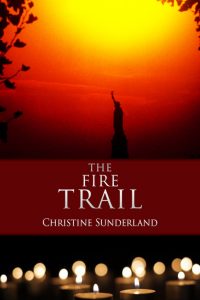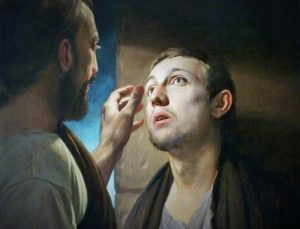by Christine Sunderland
In The Fire Trail (eLectio, 2016) I considered the border that runs between civilization and un-civilization, between the civilized world and the wilderness. Once Adam and Eve were expelled from the Garden of Eden, mankind has worked to tame the natural world and its wild-ness in order to survive. Man created communities, cities, safe shelters, protected from the natural wilderness, as well as the wild-ness of other men. When God chose a people to save men from themselves, he burned laws into stone tablets high on a mountain. Through Moses, the law was burned onto their hearts as well, giving his chosen people a pathway forward, a way to live together in the wildness of the world. These laws became foundational to community, community with one another, community in the world, vitally necessary to a civilized civilization.
In Angel Mountain, my novel-in-progress, I am considering a related border, one that rims the horizon between Heaven and Earth. This is a border between eternity and time, a crossing when we leave our bodies and head for Heaven. It was and is a journey intersected by a cloud of witnesses, angels and saints, watching over us.
As Christians we know these intersections. We know that our movement through time into eternity happens daily, hourly, second by second, through prayer, through love, through paying attention. We have joined God’s chosen people of the Old Covenant and Old Testament to become the chosen of the New Covenant and New Testament. With those stone tablets, pillars supporting our civilization, we can see our path through time, into eternity. With those tablets of law, and with the fulfillment of the law in Christ, the living embodiment of the love of God, the border between Heaven and Earth has been erased. The two realms now merge like Impressionist dots on a canvas of color, and our path, our life-line through time is brightened again and again by the en-lightened touch of Christ.
As Christian storytellers we reflect that life-line through time in the pages and chapters of our novels. Our stories have beginnings, middles, and endings. Words form sentences, sentences form paragraphs, and paragraphs form scenes. The scenes journey through the chapter to a quasi-end, and the chapters follow a path through the woods of words to the crisis, to the mountaintop, then ease off to a satisfying resolution. We pull order from chaos, hope from despair, life from death. We love the unlovable, console the dying. We, within the brightly burning light of Christ, have been chosen to civilize our culture of incivility.
How this is done, the many ways a story is sculpted, is the art form of the novel. Each writer will follow the path at a different pace. Each will pause and reflect at certain crossroads, where characters meet, interact, and discover more about who they are and where they are going. Each author will choose how many words to devote to a character, a scene, a chapter. Each writer must reflect the true nature of man, of God, of life, of death. They must choose the promontories, the view-points, where the characters consider their lives and what it means to be human.
This linear structure of the novel is satisfying to the reader, for it reflects their own journey through time. Readers, like novelists, are bound by the rules of existence: days and years, the compass of calendars with the whirling sun rising and setting. In this sense our lives are like art forms, with boundaries and rules within which become expressions. But expressions of what? We are sacraments created and inhabited by God, but what is the outward form of our inward spiritual grace? How are we to live given our limitations?
And so we ask the reader through our characters, “How do we make the most of the short time given us, this time we call our lives, the time of our lives?” We ask the question in the development, the depth, of the characters. Like us, our characters are complex creatures, born of flesh and of spirit, with beginnings, middles, and endings. Our characters look back on their lives, those crucial cross-roads in their own time, and are able to relive them in their memory. Not only can they relive them, but they can dwell upon the meaning of past moments, savoring or not savoring, the flavors of their experience. They spend time in their past, at least the past that formed their present, those key hours or days, those squares on the pages of the calendars of their lives.
For each character, while traveling in a linear fashion, heading for Heaven, is full of Heaven already, woven with the golden thread of their Creator and his angels. Each recognizes light filled moments, those epiphanies when God enters their minds and hearts and changes their seeing.
Changes of sight—awareness of personal failures and personal victories and knowing the difference—is of compelling interest to Christian novelists. We seek to lighten the darkness around us by pulling the reader into each character, so that the reader also experiences changes in sight. They too, by the end of the story, are heading for Heaven. They too can cry, “I was blind, and now I see.”
What we see or what we don’t see makes all the difference. What we “get” and what we don’t “get” makes all the difference. Without a map we are lost, and it is the job of Christian writers, especially fiction storytellers, to offer a map to Heaven, a path beyond borders, full of grace and truth.
A Christian novelist reflects the path of life through time into eternity, a path on Earth intersected by Heaven @Chrisunderland #ACFWBlogs #writing Share on X Christine Sunderland has authored six award-winning novels: Pilgrimage, set in Italy, Offerings, set in France, Inheritance, set in England, Hana-lani, set in Hawaii, The Magdalene Mystery, set in Rome and Provence (all Oaktara), and The Fire Trail (eLectio), set at UC Berkeley. She serves as Managing Editor for the American Church Union (www.AmericanChurchUnion.com). Visit Christine at www.ChristineSunderland.com (website and blog).
Christine Sunderland has authored six award-winning novels: Pilgrimage, set in Italy, Offerings, set in France, Inheritance, set in England, Hana-lani, set in Hawaii, The Magdalene Mystery, set in Rome and Provence (all Oaktara), and The Fire Trail (eLectio), set at UC Berkeley. She serves as Managing Editor for the American Church Union (www.AmericanChurchUnion.com). Visit Christine at www.ChristineSunderland.com (website and blog).


Comments 2
And now I stand suspended
between the Heaven and the Earth;
between that which is portended
and the soil that marked my birth.
I’ve traveled far and traveled fast,
for cancer holds the whip,
and unto God my fate is cast
and I am stranded in the strip
of Khayyam’s herbage strewn
that guards the ancient border
between the desert and the sown,
and as sentinel, keeps order.
The desert of my past, lost days
gives voice to the coming Praise.
This sonnet makes reference (through a Christian lens) to Quatrain 11 of Omar Khayyam’s ‘Rubayat’:
With me along the strip of Herbage strewn
That just divides the desert from the sown,
Where name of Slave and Sultan is forgot–
And Peace to Mahmud on his golden Throne!
Thank you Andrew. Profound. When will your poetry be published? “And now I stand suspended between the Heaven and the Earth; between that which is portended and the soil that marked my birth…” We all are suspended, but you are closer to Heaven than some, or maybe not. One doesn’t know what the next day will bring. I thank God for your great gift and that you are sharing this with all of us. Our past desert, lost days gives us voice because we are sown with the name of Christ. Glory be to God.
If readers haven’t gone to Andrew’s website, do so—he is weaving heaven into earth, daily.